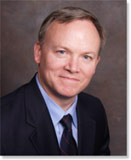 An Interview With Christopher J. Hart M.D., F.A.C.S.
An Interview With Christopher J. Hart M.D., F.A.C.S.
A native of Atlanta and trained as a surgeon at the Mayo Clinic, Dr. Christopher J. Hart has been performing bariatric surgery since 1997. Currently practicing at The Atlanta Bariatric Center at Emory Johns Creek Hospital, Dr. Hart also serves as Clinical Assistant Professor of Surgery at the Emory University School of Medicine, where he is a founding member of its bariatric program. A Diplomat of the National Board of Medical Examiners and a member of the American Society for Metabolic and Bariatric Surgery (ASMBS), Dr. Hart recently shared his views about his bariatric practice as well as the future of bariatrics with OH Magazine.
OH: How many years have you been performing bariatric surgery and how many surgeries have you performed?
Dr. Hart: I have been performing bariatric surgery for 12 years, and I have performed over 2000 bariatric procedures.
OH: Why did you become a bariatric surgeon?
Dr. Hart: I was initially trained by a bariatric surgical guru, Dr. Michael Sarr, at the Mayo Clinic. However, it was the technical challenges that came later with the advent of advanced laparoscopic techniques that piqued my interest. Once I saw how the surgery changed the patients? lives, I knew I had found something I loved to do.
OH: What is most rewarding about being a WLS surgeon?
Dr. Hart: The most gratifying aspect of my work is seeing my patients? lives transformed from a world of limitations to a lifetime of possibilities. Knowing that with one surgical procedure we can help a patient alleviate or resolve numerous medical problems.
OH: Does your family have a history of obesity?
Dr. Hart: Yes. So many families in America today have members who are struggling with weight-related issues, and my relatives are no exception. There always seems to be someone in the family who appears to be able to eat at will and without consequence, but most of us have to work and be mindful of our eating habits and lifestyle choices in order to stay healthy. Over the years, several of my relatives have suffered the devastating consequences of obesity-related health problems. Fortunately, nowadays we have several options available, including various surgical procedures to help people get the excess weight off and keep it off in the long run.
OH: I recently interviewed Jamie Dukes and he had high compliments for you as his surgeon. How did you/he decide on the Realize Band for his surgery?
Dr. Hart: After talking to Jamie and going over the options, we decided on the Realize Band. Jamie's main problem was simply eating too much food. He already had the exercise component in place, and he made reasonable choices in what he ate - he simply ate too much of what he chose to eat. Adjustable gastric banding like the REALIZE Band can be very effective in patients for whom the volume of the food they consume happens to be the main culprit.
OH: Can you tell us how the REALIZE Band is different from the Lap Band?
Dr. Hart: Both bands have similar clinical outcomes, and both bands have evolved through technical development to be quite similar in appearance and function. One of the main differences between the two, at the present time, is the access port. I find it much easier to place and access the port with the REALIZE Band. Also, the REALIZE Band has a website called REALIZE mySUCCESS that helps patients stay on a track towards long-term success.
OH: Is it easier to perform a surgery on someone who has had a lifetime of being athletic in comparison to one who has not? Or is there no difference? Did Jamie's background help him recover from the surgery faster than others?
Dr. Hart: We stress with all of our bariatric patients the importance of lifestyle changes, including proper nutrition and a regular exercise program. For some patients who are more debilitated prior to surgery, we have to start with a very modest exercise program and work towards achievable goals. For Jamie, the exercise program was already an integral part of his lifestyle, so there was an easier adaptation post-operatively. On the other hand, being a retired professional athlete is not without its challenges. As an offensive lineman in the NFL, Jamie was rewarded for being large. After retirement, he could no longer eat with a training-table mentality of 'bigger is better'. Even though he maintained an exercise program, it was no longer the 4 to 6 hour-a-day workouts of a professional athlete, so Jamie had to re-adjust his mindset more than some patients when it came to food.
OH: When speaking to Jamie, it is obvious that he is very dedicated to being a successful patient. What are the key ingredients to a patient?s success?
Dr. Hart: The key component for a patient's success begins BEFORE the surgery with careful evaluation and education. It is important for a patient to understand how the surgery works so that they can begin some of the lifestyle changes that are required prior to surgery. After surgery, exercise, a healthy diet, and regular follow up with a comprehensive bariatric team-approach are important for long-term success. Perhaps the most important factor is a patient's attitude: accepting responsibility for their lifestyle choices, and taking action to live a healthier life with a positive outlook.
OH: So that our readers get a chance to know you better, what are some of your hobbies and passions?
Dr. Hart: I love spending time with my wife and daughters. I enjoy music, and I'm an avid reader. I play competitive tennis. I have been preaching the importance of regular exercise to my patients for years, so a couple of years ago, I decided to "walk the walk" and train for a triathlon and have participated in a few since then. They are a lot of fun. Fortunately my wife is very active, so we share a number of sporting hobbies.
OH: Besides Jamie Dukes, who is your most memorable patient and why?
Dr. Hart: My very first bariatric patient won't let me forget her! She comes by the office to visit all the time, and she brings her friends and co-workers for surgical consultation.
OH: What do you see for the future of bariatrics?
Dr. Hart: I am sure we will continue to see technical advances in the type of surgeries that are performed, augmented by an improved understanding of the bio-physiology of obesity. From a healthcare delivery standpoint, my hope is that we can dramatically improve patient access to bariatric surgery.


